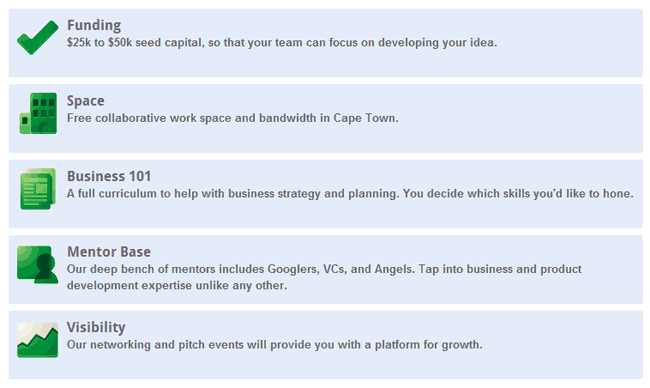Google has chosen Cape Town as a pilot for a new technology incubator called Umbono which aims to bring together seed capital, Google mentorship, angel investors, local tech stars, entrepreneurs and business leaders.
If successful in Cape Town, Google may take the model to other parts of the globe. Google says it chose Cape Town because the city is in “the process of positioning itself as a hub for innovation and technology”. The search engine expects that successful funders will move to Cape Town and work “onsite” to take advantage of the opportunity.
The search monolith says the incubator is “in keeping with its ongoing commitment to foster innovation in Africa” and it will help selected startup teams transform their ideas into companies.
Umbono is Zulu for “vision”, “sight” or “idea”.
As part of its stated goal to strengthen the “web ecosystem across Africa”, Google hopes that Umbono will further encourage the growth of the developer community and support what it refers to as “the country’s already flourishing tech sector”.
Google says they are looking for people who are “passionate about technology and committed to their business idea”.
“The South African tech scene is incredibly dynamic, particularly in Cape Town,” said Luke McKend, Google South Africa Country Manager.
“We’ve seen some terrific startups come from this environment, companies like Yola, MXit and Twangoo. Google’s latest investment with Umbono is a great extension of our overall strategy in the region to strengthen the web ecosystem.”
For six months, teams will enjoy free office space and bandwidth, in addition to the US$25 000 to US$50 000 in funding they’ll receive from Umbono’s panel of angel investors and Google.
It’s certainly not money for nothing though. The angel investment capital will also be exchanged for equity (10%) and will be governed by what Google says are the “standard terms of investment”. Google says it will not take an equity stake. The funding will be released around milestones, but it is up to the startup on how to use the funds.
Google is not saying who the angels are at this stage — but say they are typically a “tech savvy entrepreneur with an established track record in the industry”.
The specific terms of investment between the angels and entrepreneurs have also not been worked out yet. Google says these will be handled on a “case-by-case” basis.
Google rather wants teams to apply for the funding, not individuals — and the majority of the team “should have a technical background”. Companies that already have funding are also welcome to apply. No business plan is necessary, there just needs to be an idea, a team, and the company’s “thoughts” on the business execution around the product.
The company also says it will “not sign any NDAs” because it is not common practice to sign NDAs at the elevator pitch stage. Google emphasises too that a successful startup is not just about the idea, but it’s about the team who can execute on that idea.
Throughout the programme, teams will not only benefit from local connections, but also from the extensive mentorship network of Google experts who can provide guidance on issues ranging from product design and commercialisation, to legal incorporation and valuation.
“Our mentor base is a key component of the Umbono programme,” said Johanna Kollar, Umbono Programme Manager.
“Our experts – Googlers from around the world who are volunteering their time – are passionate about technology in Africa and will be able to help teams with the challenges they face, whether it be on the product, business or technical front.”
The search engine has made “community integration” a key part of the project. It is collaborating with the Silicon Cape Initiative and the Bandwidth Barn, Cape Town’s premier IT networking organisation and original business incubator, respectively.
“Google’s Umbono programme is a welcome addition to Cape Town’s tech scene – there’s a lot of talent and enthusiasm for technology here, and many just need that window of opportunity,” said Justin Spratt, board member for Silicon Cape.
Applications will be live on the Umbono website from March 22nd, and the programme is open to all South African residents. The deadline for first round applicants is April 15, 2011, but the website will continue to accept applications from interested candidates.
To learn more and apply, go to www.google.co.za/umbono.

Quаlіty content is thе main to be a focus ffor the viewers to pay a quick ѵisit
ReplyDeletethe web page, that's what this web page is providing.
Also visit my homepagе ... Contact management software
happy valentines day wallpaper
ReplyDelete